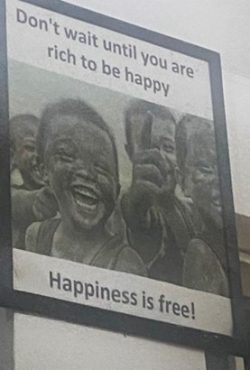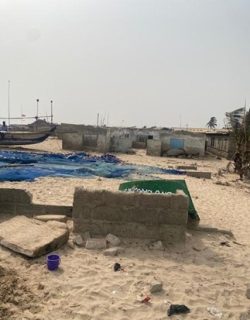Date: 23/01/2024

Bio:
Laurence Cannings is a South Coast DTP student based within the Geography department of the University of Southampton. His project explores how objective and subjective wellbeing are impacted, and associated, within an environmental context.
Using Volta Delta (South Ghana) as a case study site, fieldwork in eight communities was undertaken in early 2023 to challenge and/or validate quantitative survey analysis exploring how environmental conditions impact different strands of human wellbeing, and how the landscapes in which communities reside influence these relationships.
Does money equal happiness?
Does money equal happiness? This is an age-old question across different global contexts and academic disciplines. Studies of high-income countries often view money to increase individuals’ aspirations and happiness to a point but plateaus when a certain threshold is fulfilled, whereas others interpret happiness independently of financial or material success, and instead, believe it to be driven by community relationships and self-development (Böhnke & Kohler, 2010).
Despite posters across a hotel I stayed in in Akatsi, proclaiming ‘happiness is free’ (see figure 1), all community focus group respondents, with one exception, proclaimed ‘YES’ when I asked whether money is needed for happiness. These responses challenge the romanticised assumption of ‘happy farmers’, content with living within close-knit communities, despite financial and/or material poverty (Kay & Jost, 2003).

Figure 1: Poster near a hotel in Akatsi.
Multiple reasons why ‘money equals happiness’ were presented across various visited communities. Firstly, many noted that ‘money is blood’, meaning money is essential in maintaining the fabric of Ghanaian culture, encompassing health and social relationships (Hasty, 2005). However, differences in responses also existed, with the role of money in creating ‘social status’ primarily mentioned by peri-urban respondents, whereas the need for money to strengthen family relationships was frequently mentioned by agricultural households. The former was explicitly referenced within Sogakope, where many of the communities’ youth made ‘quick money’, often through illegal means, to increase their reputation.
These findings suggest the associations between objective and subjective wellbeing may differ depending on the broader context. Nevertheless, despite the consistency of responses, quantitative analysis did unveil how communities within different environmental landscapes may experience opposing objective (expenditure poverty) and subjective (happiness) outcomes. It is recognised how the near-unanimous agreement of ‘money DOES equal happiness’ may have been influenced by my positionality, and how my engagement with local government officials may have led participants to believe I could provide immediate financial support.

Quote:
Drought has become part of their lives, whether it rains or not, they stay in the same position (Male interview respondent)
Quantitative regression models highlighted a broad distinction between low objective/high subjective wellbeing (‘poor/happy’) communities within rural areas exposed to drought and/or erosion, and high objective/low subjective wellbeing (‘non-poor/unhappy’) communities within peri-urban, coastal/riverine areas exposed to flooding and/or salinisation. A selection of hypotheses behind these opposing outcomes is presented, developed from literature and community discussions.
Low objective/high subjective wellbeing
The association between low objective/high subjective wellbeing within agricultural landscapes is based upon model results and is not simply a reproduction of the common romanticised assumption that low financial OWB in rural low-middle income countries is offset by higher happiness. Agricultural communities often experience lower financial prosperity due to their reliance upon increasingly uncertain and unfavourable environmental conditions, as well as poorer connectivity to markets and public services. However, households may be able to maintain happiness through alternate channels. For example, many noted how fulfilling social expectations, by engaging with their intergenerational ‘farmer’ identity, brought ‘peace of mind’, a core component of a ‘good life’ across Ghana (Dzokoto et al., 2019).
Furthermore, visited agricultural communities also noted how opposing objective/subjective outcomes may arise from rural dwellers placing less emphasis upon financial success when self-evaluating their happiness compared to peri-urban dwellers (Guillen-Royo & Velazco, 2012).

Quote:
For urban dwellers, their focus is on making the most money…meanwhile in the rural areas, money is not their goal, their goal is having the social network working, the communal feeling of working (District Planning Officer)
Exposure to drought in these environments inevitably impacts objective wellbeing by increasing food import costs, reducing tradable yield, and undermining investments. However, persistent environmental pressures can contrastingly create ‘resilience’, where climate risks are accepted as the ‘norm’ or as part of God’s plan, reducing individuals’ worries and the negative impacts on their happiness.
Furthermore, as mentioned earlier, remoteness from key locations may reduce access to productive services (i.e. education and banking); although, restricted mobility and limited awareness of external living standards may mitigate negative impacts upon happiness, as subjective wellbeing is heavily influenced by individuals’ relative comparisons to others and previous points in time. This limited awareness was exemplified in the remote village of Nyitawuta, where a young man, the only one to travel outside the village for secondary education, spoke of his confusion when first encountering electronic equipment.
High objective/low subjective wellbeing
In contrast, coastal/riverine communities within peri-urban landscapes objectively benefit from greater service access. For example, access to non-primary employment, such as tourism, reduces households’ financial sensitivity to climate risks, whereas education access can boost households’ adaptive capacity to respond to environmental, and broader economic, social, and political challenges. Nevertheless, greater mobility and visibility of higher living standards, partnered with a more ‘individualistic’ culture within peri-urban landscapes, may reduce happiness by exacerbating relative comparability.
Comparisons to the past also influence subjective wellbeing, with many coastal communities recording reduced fish catches, hence, lower trade profits, and restrictions to natural resource access. This was exemplified in Songor Lagoon, where the government’s demand for salt, linked to its use within the emerging petroleum industry, resulted in the entire 41,000-acre lagoon being sold to private investors. Previous studies concluded that the decision removed traditional salt mining livelihoods from surrounding communities and resulted in violent conflicts between resistant communities and private police.

Figure 2. Damage to dwellings from flooding and coastal erosion in Anyamam. Despite the damage, communities continued to reside in these locations due to ‘place attachment’.
I found that greater individualism may provide objective, financial benefits by lessening obligations for resource redistribution and ensuring greater financial control. Yet, this cultural approach may limit households’ access to the subjective wellbeing benefits available from residing within collective, harmonious communities. Furthermore, exposure to coastal hazards, such as flooding, can reduce happiness by generating long-term fears, displacing communities, or damaging landscapes that hold cultural significance (Figure 2); captured by the concept of solastalgia – ‘the distress that is produced by environmental change impacting on people while they are directly connected to their home environment’ (Albrecht et al., 2007; S95).

Quote:
If you are unfortunate to have your work located at the shores of the sea you’ll always be in fear (Male focus group respondent)
By unveiling the potential for opposing objective/subjective wellbeing outcomes, this research highlights the importance for policy to incorporate various measures to ensure communities’ welfare is comprehensively captured and improved. Quantitative and qualitative results highlight the negative impacts of climatic risks on different strands of wellbeing, yet also how communities’ livelihoods and landscapes can influence these associations.
References
Albrecht, G., Sartore, G.-M., Connor, L., Higginbotham, N., Freeman, S., Kelly, B., Stain, H., Tonna, A., & Pollard, G. (2007). Solastalgia: The distress caused by environmental change. Australasian Psychiatry, 15(sup1), S95-S98.
Dzokoto, V. A., Osei-Tutu, A., Scollon, C. N., Wallace, D., & Peters-Chitwood, L. (2019). Meaning and perceptions of the good life in Ghana. Psychological Studies, 64(1), 11-20.
Guillen-Royo, M., & Velazco, J. (2012). Happy villages and unhappy slums? Understanding happiness determinants in Peru. In H. Selin & G. Davey (Eds.), Happiness across cultures: Views of happiness and quality of life in non-western cultures (pp. 253-270). Springer, Dordrecht.
Hasty, J. (2005). The pleasures of corruption: Desire and discipline in Ghanaian political culture. Cultural Anthropology, 20(2), 271-301.
Kay, A. C., & Jost, J. T. (2003). Complementary justice: Effects of ‘poor but happy’ and ‘poor but honest’ stereotype exemplars on system justification and implicit activation of the justice motive. Journal of Personality and Social Psychology, 85(5), 823.